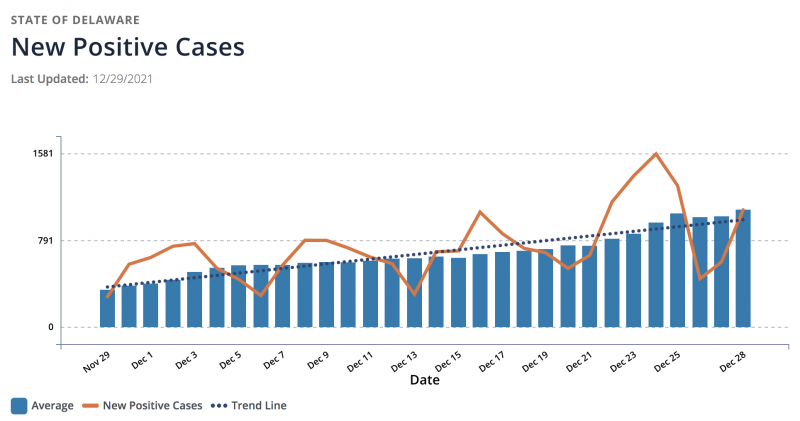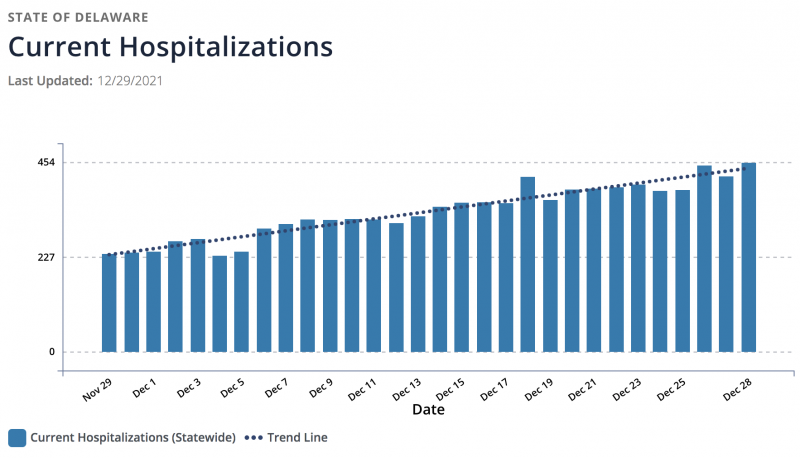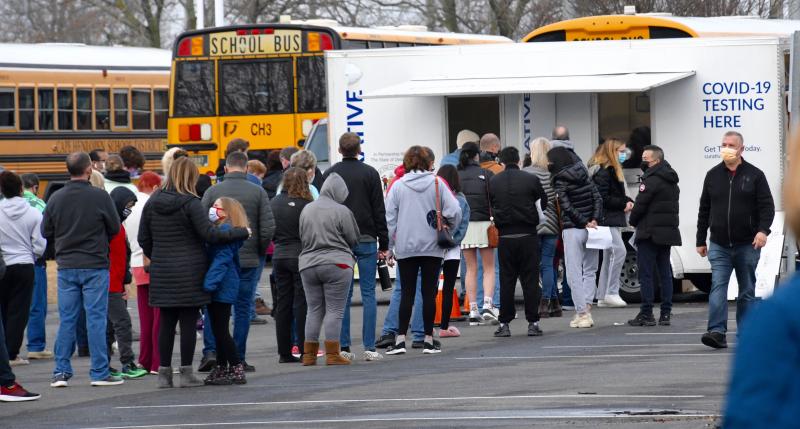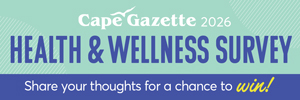COVID-19 is surging once again in Delaware.
The Division of Public Health reported the highest number of new positive daily cases since the start of the pandemic Dec. 29, with 1,991 positive cases reported. Just two weeks earlier, the number of new positive cases was 645.
Prior to the recent peak, the previous record high was 1,241 on Jan 6, 2021.
New cases had risen to 1,574 Christmas Eve before dropping to 1,293 Christmas Day. Positive cases dropped to 439 and 588 in the two days following; however, the drop was possibly due to fewer available testing locations during the holiday. The numbers jumped back up to 1,071 Dec. 28.
Hospitalizations are also on the rise, with 458 people hospitalized Dec. 29, the highest count in recent weeks. There were only 159 hospitalizations on Thanksgiving.
The percentage of persons testing positive reached 63.4 percent Dec. 28. The rate was just over 42 percent two weeks earlier and 39.9 percent Dec. 1, according to state data.
The Division of Public Health is recommending that anyone who feels sick, no matter the symptoms, should not host or attend gatherings.
DPH releases weekly data every Friday. For the week of Dec. 16-22, the Delta variant remained the dominant strain in Delaware, accounting for 247 of the 280 positive samples analyzed. The Omicron variant was identified in 33 samples.
However, the Centers for Disease Control and Prevention said Omicron accounted for an estimated 56.8 percent of new cases in the country for the week ending Dec. 25. The state’s release slated for Friday, Dec. 31, should provide additional data on the prevalence of Omicron in Delaware.
Isolation time reduced
DPH announced Dec. 28 that it will implement updated guidance issued Dec. 27 by the CDC, shortening the recommended time that people should isolate or quarantine from 10 days to five days based on certain conditions and vaccination status. Officials said the change is motivated by science demonstrating that the majority of COVID-19 transmission occurs early in the course of illness, generally in the one to two days prior to onset of symptoms and the two to three days after. Therefore, people who test positive should isolate for five days and, if they have no symptoms at that time, they may leave isolation as long as they continue to mask for five days to minimize the risk of infecting others.
“We know this sudden change in isolation and quarantine guidance will take time for everyone to review, understand and implement,” said DPH Director Dr. Karyl Rattay. “But we want to follow the science, and what it’s telling us is that people are mostly infectious earlier in their exposure, and longer periods of isolation and quarantine are not necessary. We also want to prepare folks that because it will take our contact tracers a few weeks to implement this change in our system, people may receive conflicting guidance. But we believe it’s important to empower individuals, employers and schools to make the isolation and quarantine changes themselves, providing they understand the conditions attached to the CDC’s guidance.”
Beebe asks for community’s help
During a Dec. 22 town hall, Beebe Healthcare President and CEO Dr. David Tam asked the community to do its part in keeping COVID numbers down. Looking at the numbers, he said hospitalization statistics are similar to 2020.
“The difference is we have more patients with other conditions in the hospitals – heart attacks, strokes, other medical conditions,” he said. He also noted they are expecting more flu cases this year, because masks and social distancing kept flu numbers down last year.
“We need to work together,” he said. “We know the [COVID] vaccine works. We know it makes a difference. Get your vaccine. We know the flu vaccine works. Get your flu vaccine.”
Dr. Bill Chasanov, an infectious disease physician and Beebe's COVID-19 medical director, said the majority of patients hospitalized are unvaccinated.
“I say that to everyone, because one of the most important things one can do to prevent themselves from being hospitalized or ending up severely ill and in the ICU is to be vaccinated,” he said.
Those in need of testing should go to https://coronavirus.delaware.gov/testing/ versus going to walk-in care or the emergency department.
DPH officials in partnership with medical staff from the Delaware National Guard have mobile units that offer COVID-19 vaccines in underserved communities. For a full list of community-based events statewide including those organized by vaccinating partners and community groups, go to de.gov/getmyvaccine.
Individuals with general questions about COVID-19 should call Delaware 2-1-1; people who are deaf or hard of hearing can text their ZIP code to 898-211, or email delaware211@uwde.org. Hours of operation are 8 a.m. to 9 p.m., Monday through Friday and 9 a.m. to 5 p.m., Saturday.
Medically related questions regarding testing, symptoms and health-related guidance can be submitted by email to DPHCall@delaware.gov.
Delawareans 18 or older are encouraged to download COVID Alert DE, Delaware’s free exposure notification app, to help protect their neighbors while ensuring their own privacy. Download on the App Store or Google Play.
DPH will continue to update the public as more information becomes available. For the latest on Delaware’s response, go to de.gov/coronavirus.
CDC isolation guidelines
- For those who test positive for COVID-19 – but don’t have symptoms – the isolation period can be reduced from 10 days to five days as long as the person wears a mask around others (in and out of home) for at least five additional days. Anyone with a fever should remain in isolation until the fever resolves.
- For close contacts who are unvaccinated, or more than six months out from their second dose of Pfizer or Moderna, or two months out from their single dose of Johnson & Johnson (without a booster), quarantine has been reduced from 10 days to five days, followed by mask use for an additional five days.
- For close contacts who have received their booster shot, or are less than six months out from being fully vaccinated with Pfizer or Moderna or are less than two months from their J&J vaccine, no quarantine is needed, but these persons should wear a mask for 10 days after the exposure to the positive case.
- For vaccinated close contacts who are not yet eligible for a booster – including students younger than 16 – no quarantine is needed. DPH is reviewing the guidance and evaluating its impact on the Test-to-Stay program.
Editor’s note: This story has been updated with more current statistics.
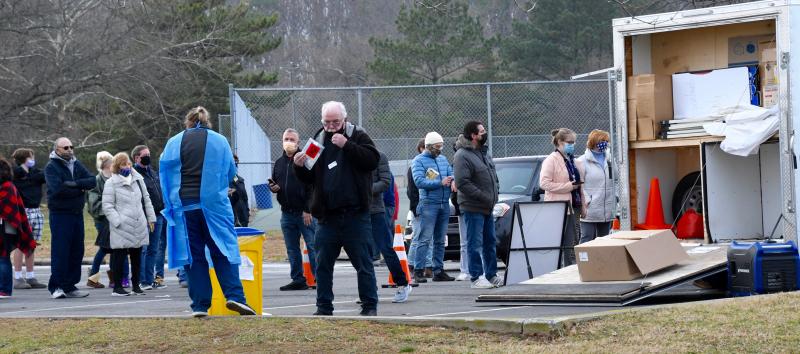
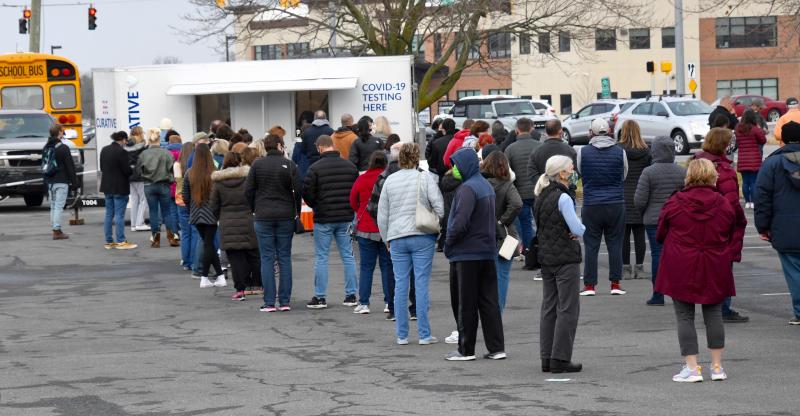
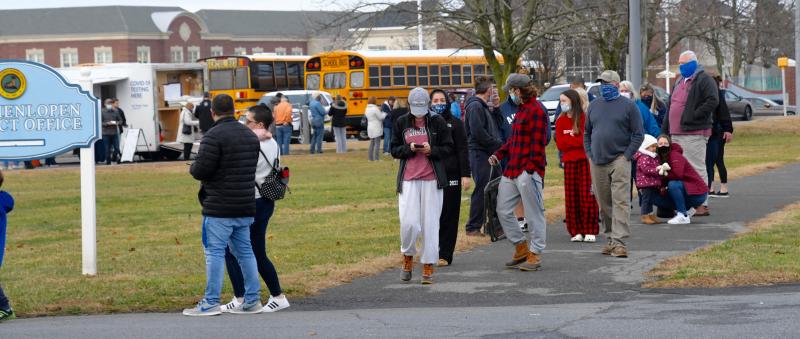
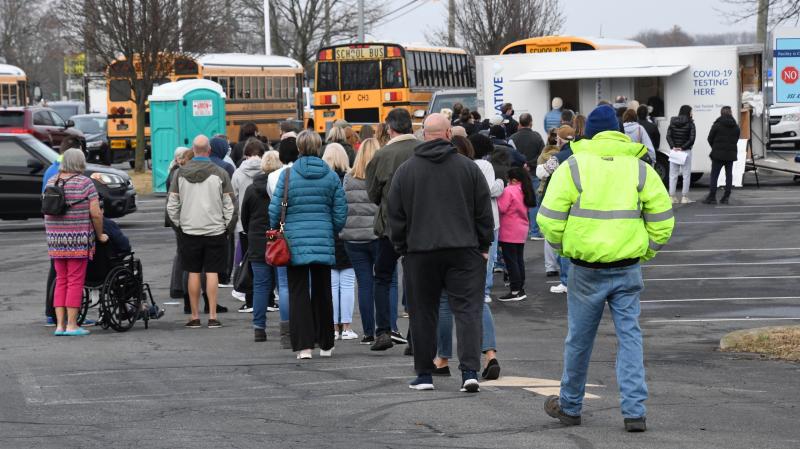
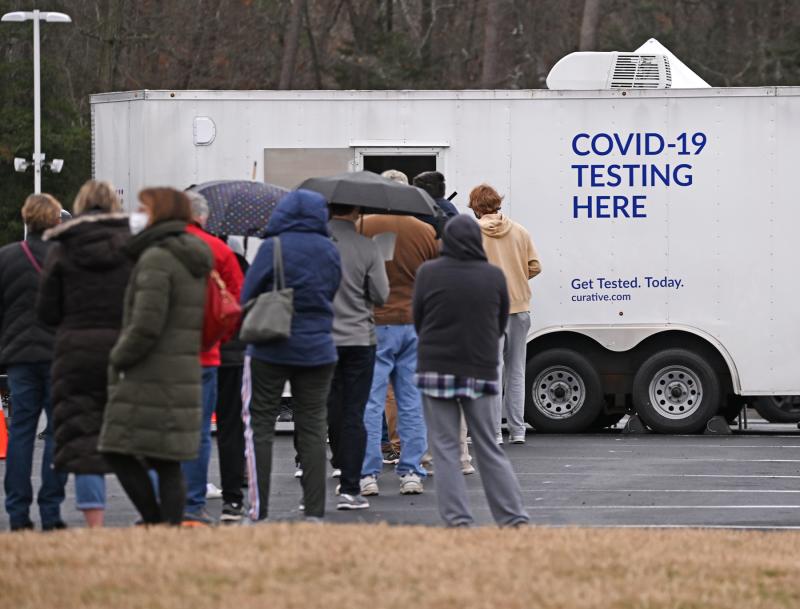
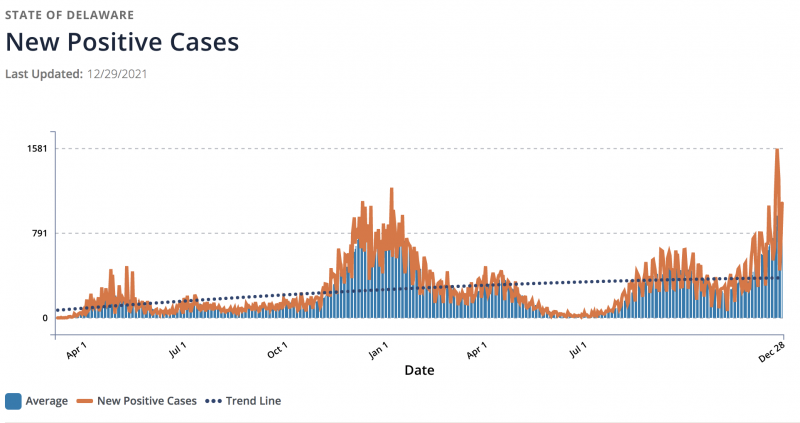
Nick Roth is the news editor. He has been with the Cape Gazette since 2012, previously covering town beats in Milton and Lewes. In addition to serving on the editorial board and handling page layout, Nick is responsible for the weekly Delaware History in Photographs feature and enjoys writing stories about the Cape Region’s history. Prior to the Cape Gazette, Nick worked for the Delmarva Media Group, including the Delaware Wave, Delaware Coast Press and Salisbury Daily Times. He also contributed to The News Journal. Originally from Boyertown, Pa., Nick attended Shippensburg University in central Pennsylvania, graduating in 2007 with a bachelor’s degree in journalism. He’s won several MDDC awards during his career for both writing and photography. In his free time, he enjoys golfing, going to the beach with his family and cheering for Philadelphia sports teams.















